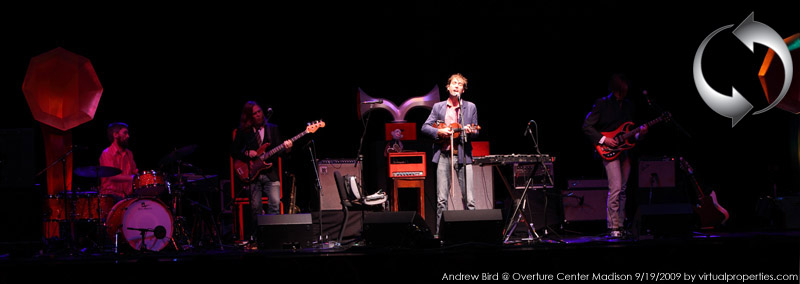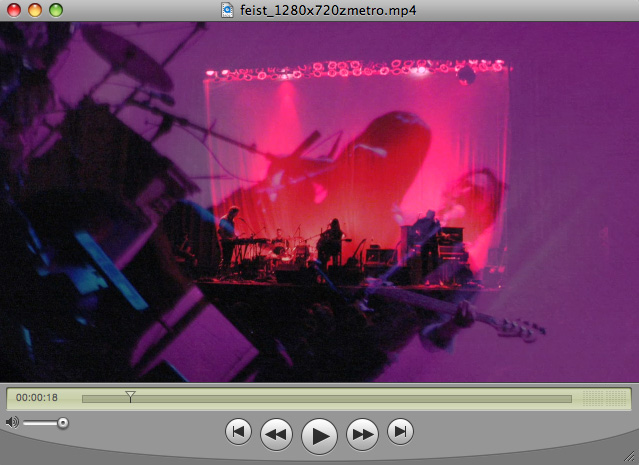
Click on the image above to view a panoramic scene. A few still photos can be seen here.
Bird appeared in Madison as part of the 2009 Forward Music Festival.
Category: Music
Lunch with the FT: Sir Simon Rattle
attle found the criticism painful. Popping another tomato in his mouth, he lets slip that the reason Lunch with the FT took so long to arrange – more than a year – was that he was stung by what I had written. “That’s why I avoided speaking to you.”
. . .
But last year his Berlin contract was extended to 2018 – an impressive vote of confidence from an orchestra that, unusually, is entirely self-governing while receiving most of its funds from the state. And a visit to the London Proms revealed a man who had matured and mellowed. He had finally begun to learn German. He still struggles to speak it (“anyone less linguistically gifted than me is hard to imagine”, he confesses), but by attempting to do so he had broken an important psychological barrier. His podium gestures were as jubilant as ever, but his Brahms had acquired unmistakable depth.
Sitting across the lunch table, I begin to understand why. Rattle is settling into comfortable middle age. The blue T-shirt may advertise a man still young at heart but the curls are white and thinning. Yesterday’s boy wonder is now older than most of his orchestra. He has begun to slow down, to be slightly less sensitive to criticism.
But there’s another factor at work. Rattle has made his home in Berlin, something not even Herbert von Karajan, his most illustrious predecessor, had done. He lives in one of the city’s leafy quarters and is often seen doing the family shopping in its open-air markets. It’s as if he has gone native. So what has he learned about the Germans?
“People are more subtle and complicated than they are made out to be,” he answers, pouring some of the red wine he has brought outside. Does this mean Germans are not the humourless caricature peddled by England’s tabloid newspapers? Rattle sighs. It wasn’t until his late twenties, he says, after discussing the horrors of the Nazi era with Viennese conductor Rudolf Schwarz, a Belsen survivor who resumed his career in Birmingham after the war, that he became aware of the complexities of national identity.
Jason Bentley Takes over Morning Becomes Eclectic
One of the biggest issues on listeners’ minds is the direction you’ll take KCRW. They wonder how much like Nic Hartcourt you’ll be and how your electronic influences will affect the morning slot. What say you?
My responsibility in this position is to integrate the influences of all the Music Directors before me, and take it to another place altogether–which means all genres of music from all over the world.Besides a reverence of Joe Strummer and The Clash and a good ear for underground bands that could appeal to a wider audience, I don’t have that much in common with Nic musically. Nic’s been great at the helm of MBE, but I’m going to bring my own music experience to the program with an appreciation of where it’s been. Yes, that does mean an affinity for Electronic music and global club culture, but that’s not all and I certainly will consider what works best during the morning hours.
Will you start focusing locally?
I feel like I do already to a great extent. I’ve been producing events locally for nearly two decades. I’m very involved in the LA scene, and KCRW is totally invested in local music, while at the same time actively making connections abroad. Personally, Silversun Pickups and Morgan Page are among my favorite local artists.
What considerations and thoughts will go into who you choose to play in studio?
Mostly looking to mix it up – everything from Afrobeat to Neo Soul and quirky Folk.
Fordlandia
The album has a theme, although it’s more loose and open to interpretation than on my last album, IBM 1401, a User’s Manual.
One of the two main threads running through it is this idea of failed utopia, as represented by the “Fordlândia” title – the story of the rubber plantation Henry Ford established in the Amazon in the 1920’s, and his dreams of creating an idealized American town in the middle of the jungle complete with white picket fences, hamburgers and alcohol prohibition. The project – started because of the high price Ford had to pay for the rubber necessary for his cars’ tyres – failed, of course, as the indigenous workers soon rioted against the alien conditions. It reminded me of Werner Herzog’s Fitzcarraldo, this doomed attempt at taming the heart of darkness. The remains of the town are still there today. The image of the Amazon forest slowly and surely reclaiming the ruins of Fordlândia is the one that gave spark to this album. For the structure and themes of the album I was influenced by the films of Alejandro Jodorowsky, Herzog and Kenneth Anger. I was interested in a kind of poetic juxtaposition and an alchemical fusion of themes and ideas, which I feel is similar to the way Anger uses montage as an alchemical technique – as a way of casting a spell. During the making of the album, I also had in mind the Andre Breton quote about convulsive beauty, which he saw in the image of “an abandoned locomotive overgrown by luxurious vegetation”. There is a strong connection to the IBM 1401 album in terms of both thematic and musical ideas and I see the two albums as belonging to a series of works.
Fascinating and quite pleasant. Clusty Search: Fordlandia.
Doonesbury on Celine
Stuck listening to Celine Dion over and over and over on a long roadtrip, I understand this Doonesbury strip.
Leslie Feist Concert Rocks Madison (Video Slide Show)

Leslie Feist rocked Madison Friday evening, 16 November 2007. Despite her severe ankle sprain (evidently while running in Omaha, NE the prior day), Feist and her band entertained the sold out Orpheum Theatre with ouststanding vocals, delightful instruments and an elegant video art show. Check out the playlist here.
More, please.
Watch an MPEG-4 Video Slideshow:
- 1280 x 768 106MB Version [Watch or CTRL_Click to Download]
- 20.5MB MPEG-4 Version for iPod and similar devices. CTRL-Click to download.
Links: Ask Clusty Search | Google News | Live | Yahoo.
Rob Thomas attended the concert and wrote this.
Listening to the National
I heard the National’s “Mistaken for Strangers” yesterday at the Electric Earth Cafe.
The Inevitable March of Recorded Music Towards Free
The DRM walls are crumbling. Music CD sales continue to plummet rather alarmingly. Artists like Prince and Nine Inch Nails are flouting their labels and either giving music away or telling their fans to steal it. Another blow earlier this week: Radiohead, which is no longer controlled by their label, Capitol Records, put their new digital album on sale on the Internet for whatever price people want to pay for it.
The economics of recorded music are fairly simple. Marginal production costs are zero: Like software, it doesn’t cost anything to produce another digital copy that is just as good as the original as soon as the first copy exists, and anyone can create those copies. Unless effective legal (copyright), technical (DRM) or other artificial impediments to production can be created, simple economic theory dictates that the price of music, like its marginal cost, must also fall to zero. The evidence is unmistakable already. In April 2007 the benchmark price for a DRM-free song was $1.29. Today it is $0.89, a drop of 31% in just six months.
Commercial Radio Excesses
American Masters: Ahmet Ertegun
“I think it’s better to burn out than to fade away… it’s better to live out your days being very, very active – even if it destroys you – than to quietly… disappear…. At my age, why do you think I’m still here struggling with all the problems of this company –
because I don’t want to fade away.”
-Ahmet Ertegun
More than most in the $5 billion-a-year global industry he helped build from scratch, Ahmet Ertegun loved the rhythm and the blues. He loved the rock and the roll, jump and swing, and all forms of jazz. More than anything, he loved the high life and the low. When he died at the age of eighty-three on December 14th, about six weeks after injuring himself in a backstage fall at a Rolling Stones concert at the Beacon Theater in Manhattan, the world lost not only the greatest “record man” who ever lived but also a unique individual whose personal and professional life comprised the history of popular music in America over the past seventy years. On every level, the story of that life is just as rich, varied and exotic as the music that Ahmet brought the world through Atlantic Records, the company he founded in 1947 and was still running at the time of his death.
More here.